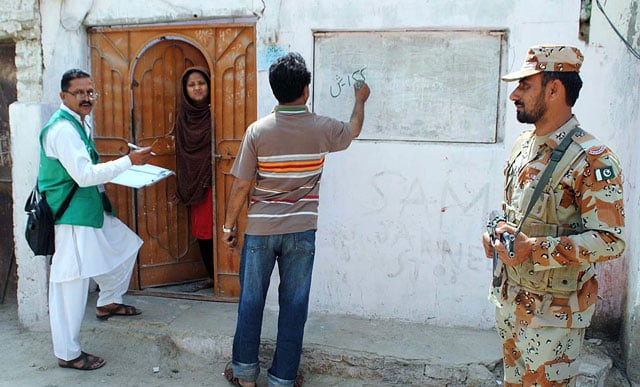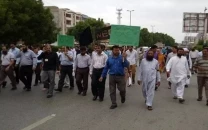Census policy fails to appease politicians in Karachi
FBS statisticians claim that Pakistan lacks resources to adhere to the demands of the naysayers

Preparations are underway to conduct the country’s seventh census, on the basis of permanent residential address which is believed to not only lead to loss of national exchequer but also like-ly to create controversies in the census results like the past.
Contrary to international standards, Pakistan had been counting its population on a de jure ba-sis from 1981 to 2017. The practice affected the population of major cities of the country, includ-ing Karachi.
The results of the country’s sixth census showed the population of the coastal city to be around 16 million; a figure that was rejected by all political parties while the Supreme Court also de-clared that the headcount of the country’s largest city was not reflective of reality.
According to Economist and Institute of Business Administration Faculty Member Asim Bashir Khan, the census is conducted on a de facto basis all over the world under which a person is considered as a resident of a place where he has been living. “However, in Pakistan, the census is being conducted on the basis of permanent address. This results in inaccurate headcount for all the citizens who are living in areas outside their permanent addresses for many years. Under the de jure system, if a citizen’s permanent address is listed in another district or province on his identity card, then he is not counted as part of his current area of residence but is rather classified as part of the population in his home district,” said Bashir. “The loophole results in undercounting of people who are living elsewhere for work, while at the same time, the head-count of their native districts is exaggerated,” he added.
An official of the Federal Bureau of Statistics (FBS) speaking on condition of anonymity said that Pakistan’s seventh census is also being planned to be conducted on a de jure basis rather than a de facto basis. “The proposal for which, has been approved in the meeting of the federal cabinet on October 5 and further approval will be sought from the Council of Common Interest (CCI),” he told.
Read More: Fresh census plan
The FBS officer further revealed that the past censuses of 1981, 1998, and 2017 were also con-ducted on a de jure i.e. permanent address basis, while ambiguity is also found in the census of 1972 due to which the population of Karachi has been continuously undercounted.
It should be noted that Rs23 billion will be spent on the next census, while Rs5 billion have been allocated for the current financial year. In principle, the census should be conducted every 10 years, but for the first time in the country, it is being conducted after five years owing to the controversies that surrounded the 2017 census.
The allocation of seats in the National and Provincial Assemblies is made on the basis of the population counted on the de facto basis, in addition to the delimitation and demarcation of lo-cal government constituencies.
During the 2017 census, some cities of the country, especially Karachi, were victim to census undercounting. Although teams from the statistics department visited houses for the census and filled the forms, they did not count people with temporary addresses as citizens of Karachi. In addition, there were several blocks in Karachi where there had been negative growth due to which the population of these blocks decreased from the 1998 census.
Per Asim Bashir Khan, he had analysed 1,040 constituencies where census blocks of some con-stituencies had zero population despite there being houses and people who have lived there many years. “This means that families and individuals are counted where their ID card address-es are written for. Jacob Line is a densely populated area of Karachi but only three households and a population of 326 people is being shown here. This comes to a surprising average of 108 people per household,” revealed Khan, adding that other areas like parts of Gulshan e Iqbal also experienced a similar situation.
Addressing the matter Karachi’s Amir Jamaat Islami Hafiz Naeemur Rehman, said that that the federal government’s policy of conducting the census on a de jure basis halved the population of Karachi in 2017. “Now the new census is also being planned on the de jure basis which is noth-ing but political point-scoring, it is not only a betrayal of the people of Karachi but also a waste of national exchequer. Hence, Jamaat-e-Islami rejects this policy and demands the census to be conducted on the de facto basis as per international norms,” he asserted.
On the other hand, however, FBS Chief Statistician Dr Naeem Alzafar maintained that although some political parties and stakeholders have rejected the de jure policy, we simply do not have the budget or finances for a de facto system. “Census is done on a de facto basis only in coun-tries where the population is very small. As we cannot afford to conduct the census on a de facto basis will try to remove the reservations of political parties, and citizens who have been living in the area for six months will be counted in that area. Whereas, the impression that migrants are not counted in Karachi is also wrong. Be it the Afghan refugees, Bengalis, Burmese or anyone who has been permanently residing in Karachi will be counted as part of the population of Kara-chi,” he told The Express Tribune.
Published in The Express Tribune, January 11th, 2022.



















COMMENTS
Comments are moderated and generally will be posted if they are on-topic and not abusive.
For more information, please see our Comments FAQ